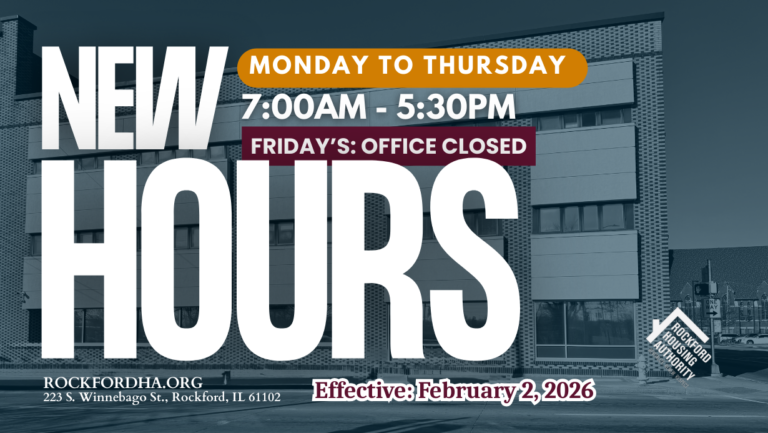
The Rockford Housing Authorities’ Housing Choice Voucher Program provides rental assistance for very low and low-income households. Rental assistance is provided on behalf of the family or individual participants to private landlords. Program participants are responsible for choosing the type of housing they feel best suits their household. They can select a single-family home, townhouse, or an apartment.
Once the participant has chosen their housing unit and the landlord is willing to accept the housing voucher towards the payment of rent, the housing authority will inspect it to assure that it meets the federal minimum housing quality standards and any local building codes. All rental units must meet minimum standards of health and safety.
A housing subsidy is paid to the landlord directly by RHA on behalf of the participating family. The family then pays the difference between the actual rent charged by the landlord and the amount by the program.
The first thing in becoming a landlord with the Rockford Housing Authority Housing and the amount by the program.
The first thing in becoming a landlord with the Rockford Housing Authority Housing Choice Voucher (Section 8) program is to review the Owner’s Information Packet.
You may stop by the office to pick up this packet or request to have it mailed to you. This packet will include a Sample of HUD’s Housing Assistance Payment Contract, IRS-W-9 form, Landlord Information and Inspection requirements.
List your vacant property – Ensure you are registered with GoSection8.Com and ILHousingSearch.org
If you are interested in listing your property, Owners can register their properties at affordablehousing.com (866-466-7328) or ILHousingSearch.org (877-248-8844). Follow the instructions to create a username and password. It is ultimately the family’s housing choice to decide where they wish to live. Listing your property does not guarantee a tenant.
Complete the RFTA and turn into the HCV office
When an applicant with a voucher applies for your unit, you are responsible for following your standard application screening process to determine suitability. Once you have approved the applicants to rent the unit, you will complete the request for tenancy approval packet (RFTA) provided by the applicant and return it to the RHA. Once the RFTA has been processed and determination of rent reasonableness has been conducted, one of our inspectors will contact you to schedule a physical inspection of the unit.
Inspection of the Unit
Once the RFTA is approved, you will be contacted by RHA within the next 5 to 10 days to schedule an inspection. The tenant should not move into the unit until it passes inspection. Once the unit passes inspection a lease can be executed.
Landlord and Tenant sign a 12-month Lease Agreement
After the unit has passed inspection, and rental price has been approved, the landlord and tenant must determine the “move-in date” in order to enter into (at least) a 12-month Lease Agreement. Keep in mind that the term of the lease cannot begin prior to an approved inspection date. A copy of the signed lease agreement is submitted to the RHA so we may prepare a Housing Assistance Payment (HAP) Contract with the owner.
Landlord signs the Housing Assistance Payment Contract
Once the Section 8 department has a copy of the signed lease, we will prepare the HAP Contract. The effective date of the HAP Contract must match the dates on the lease. The RHA will hold any payments due an owner until the HAP Contract is signed and returned to the RHA.
HAP payments are issued
The monthly payments for RHA landlords are processed on the 1st and the 15th of each month. RHA will pay a portion of the tenants rent and the landlord continues to manage their property as they would with a private market tenant.

The purpose of the Housing Choice Voucher (HCV) program is to provide rental assistance to eligible families. The rules and regulations of the HCV program are determined by the U.S. Department of Housing and Urban Development. The RHA is afforded choices in the operation of the program that are included in the RHA’s administrative plan, a document approved by the board of commissioners of the RHA. The HCV program offers mobility to eligible families because they may search for suitable housing anywhere in the RHAs jurisdiction and may also be eligible to move under portability to other RHAs’ jurisdictions.
When a family is determined to be eligible for the program and funding is available, the RHA issues the family a housing voucher. When the family finds a suitable housing unit and funding is available, the RHA will enter into a contract with the owner and the family will enter into a lease with the owner.
Each party makes their respective payment to the owner so that the owner receives full rent. Even though the family is determined to be eligible for the program, the owner has the responsibility of approving the family as a suitable renter. The RHA continues to make payments to the owner as long as the family is eligible, and the housing unit continues to qualify under the program.
Rental property owners who participate in the RHA’s HCV program must:
Comply with all requirements of the HAP contract and lease. The terms of a lease cannot be changed without the RHA’s written acknowledgment.
The Housing Choice Voucher Program is a federal rent subsidy program that assists low-income households with monthly rental payments.
The Rockford Housing Authority administers funds received from the U.S Department of Housing and Urban Development (HUD) and distributes them, in the form of Section Housing Choice Vouchers, to eligible families and individuals. A voucher allows program participants to rent housing that meet their needs at a price they can afford.
All eligible families are required to pay at least 30% (but no more than 40% initially) of their monthly-adjusted income toward rent and utilities, directly to the landlord. The Rockford Housing Authority pays the landlord the difference between the Contract Rent and the tenant’s portion. A tenant must find housing within 60 days or risk losing the voucher.
The Rockford Housing Authority reviews the eligibility of the participant(s) based on household income and family composition. The landlord is responsible for screening occupants of the rental unit. This screening process must be in accordance with federal, state, and local equal opportunity laws.
All clients eligible to transfer to a new unit should have a current Housing Choice Voucher in their possession. You should verify that the Voucher has NOT yet expired and that the bedroom size on the voucher corresponds to the bedroom size that the client states they are eligible for. In addition, you should have the potential tenant complete any rental application, and reference information that you require. Once you have determined that the client is suitable for your unit, then complete and submit the Request for Tenancy Approval.
Typically, the Rockford Housing Authority will notify the tenant of the status of the RFTA within ten (10) days.
Typically, the Rockford Housing Authority will inspect the proposed unit and notify the owner/tenant of the outcome within fifteen (15) days.
When a tenant receives the voucher from their Housing Counselor, they are instructed to pay their TTP (Total Tenant Payment) until they receive an official letter from the Housing Authority of their new rent portion. This amount should be notated at the bottom of the client’s Housing Choice Voucher (which should be reviewed by you – prior to completing the Request for Tenancy Approval). If there is any discrepancy, the tenant’s Housing Counselor can be contacted for clarification.
When the Rockford Housing Authority terminates the housing assistance payment due to the client’s non-compliance with program regulations, then the lease agreement is terminated -regardless of whether or not the lease has naturally expired. The RHA may NOT continue payments on behalf of a client who has not complied with the rules of the program.
The individual landlord/owner is responsible for enforcing the terms/conditions of the lease agreement. However, the landlord should always provide the agency with copies of notices sent to the tenant regarding lease violations (7 Day Notices, 3 Day Notices, Warnings etc.). In general, an HCV Participant should be treated no differently than any other unassisted tenant. If our client is committing serious/repeated violations of the lease – then the landlord should enforce the lease in accordance with Florida law (providing copies of all paperwork to the Rockford Housing Authority). The Rockford Housing Authority can act as arbitrator to help resolve problems and, upon written request, the Housing Counselor will counsel the family regarding a repeated problem the landlord may be experiencing with a tenant, only after the landlord has personally tried to resolve the matter first himself. The property owner may retain the security deposit for the amount of unpaid rent and any damages caused to the unit. Notify the RHA of any outstanding balances.
The owner is required to notify the Rockford Housing Authority, in writing, at least sixty (60) days before any change in the amount of rent to owner is scheduled to go into effect. Any requested change in the rent to owner will be subject to rent reasonable requirements. How much of a rent increase will be approved is contingent upon the rent reasonableness results.
A written lease is required. The first lease must be for a 12-month period. After that, the landlord and tenant can agree to any term length, however, the tenant will still be required to undergo a recertification for eligibility every 12 months.
VAWA gives protections from eviction for a victim of domestic violence, dating violence or stalking. While you cannot evict the victim, you may be able to evict the perpetrator of the act if that person is a member of the household.
The Housing Quality Standards (HQS) Inspector will want to look through each room of the entire apartment including the basement, common rooms (like laundry rooms) and any areas that are associated with the apartment such as entry halls. He/she will be evaluating the apartment using the national HQS protocol (HQS standards) and also in some cases local or state requirements which are more stringent than HQS. There are many things to evaluate. In a nutshell, the HQS Inspector will want to determine whether or not required items are present in the apartment, that every item present in the apartment works and that the apartment is “safe, sanitary and decent.”
The HQS Inspector will not do a lead paint inspection of the apartment. He/she is not permitted to do this type of inspection. For the purposes of HQS inspection (If there is a child under 6 or a pregnant woman living in or expected to live in the apartment and if the building was built before 1978) the inspector will assume that all painted surfaces contain lead-based paint. The HQS Inspector WILL DO a Visual Assessment of all painted surfaces. The lead paint policies of HUD and the Housing Authority are intended to be Proactive about the possible presence of lead paint hazards in any subsidized living unit.
No. In an HQS inspection any one or more deficiencies that fail will FAIL the entire inspection
An HQS inspection is not a “Code” inspection. There are many types of codes, ordinances, laws and protocols that apply to housing units in your local area such as building codes, housing ordinances, State fire codes and so forth. As a rule, the HQS inspection follows the HOS protocol that you will find on the HUD checklist on Form 52580. The HQS protocol is the same across the United States. HQS does allow for State and local code requirements that are more stringent than HQS, including State fire codes regarding smoke detectors and second means of egress as examples. In these cases, the HQS inspector will enforce the more stringent requirements.
No. The HQS inspector will inspect the apartment subsidized under the HCV program only. That inspection will not include the other apartments in the building. It will include common areas, basements and exterior areas that would be used by the tenants of the subsidized apartment and utility areas.
As a rule, no. While problems in the neighboring apartments might be important, the HOS inspector is concerned with the condition of the subsidized apartment.
A new HQS inspection is required in these cases. The HQS inspection requirement always applies even if the apartment has been inspected in the past or if the building is new.
The HQS inspection report will be given to the appropriate Housing Authority. The landlord will receive notice of any and all deficiencies (Fail Items) including the time allotted for repairs to be completed. Often the HQS inspection is the last step in the rent-up process. Both tenant and landlord should check with the appropriate person at the Housing Authority before proceeding. Different Housing Authorities have different policies and procedures regarding rent-up. It is important for all parties to follow the procedures correctly.
No. There is no “grandfathering” provision in HQS. Apartments in older buildings will be evaluated according to HQS just like any other building.
The landlord and the tenant enter into a lease that is binding on both parties just like any lease. If damage to the apartment occurs, it should be handled according to the provisions in the lease. The landlord is not penalized by the Housing Authority for tenant damage, but all damages need to be appropriately corrected. For example, the HQS inspector will fail a broken window regardless of who broke it. If the window was broken by the tenant, it is normally up to the Landlord and the tenant to work out a way to get the window fixed within the allotted time and that is normally done according to the provisions in the lease.
Each Housing Authority has specific policies regarding completing repairs after an HQS inspection. Life threatening items such as malfunctioning smoke detectors usually must be repaired within 24 hours. Standard deficiencies such as a burner on a stove that does not operate usually must be repaired within 30 days. It is a good idea to check with the Housing Authority regarding their specific policy.
The Housing Authority will either require a physical “re-check” of the apartment or require landlord certification that the work has been completed. When a physical re-check is done only the items that failed the inspection are checked. The HQS inspector will check the failed items from the failed inspection. He/she will not conduct a completely new inspection.
Holiday schedules, safety reminders, and community support updates.
